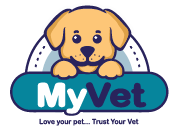As loving pet owners, we want to keep our furry friends safe from harm, but danger can sometimes be closer than we think, right inside our own homes. Many everyday items, from household cleaners to foods we eat, can pose serious health risks to pets if ingested. That’s why pet poison prevention is so crucial. By learning what’s toxic and taking proactive steps, pet owners in Chesapeake and beyond can create a pet-friendly household environment and ensure their furry companions stay out of harm’s way. Prevention is key to keeping your pet healthy and happy.
Common Household Poisons for Pets
It’s surprising how many common pet poisons are found in everyday household items. Pet owners need to be aware of what can be harmful and take measures to keep their furry friends safe. Some of the most dangerous household poisons include:
- Human Medications: Over-the-counter and prescription drugs such as ibuprofen, antidepressants, and cold medicines can cause serious reactions in pets.
- Cleaning Products: Bleach, ammonia, and other chemical cleaners are highly toxic if ingested or inhaled.
- Plants: Many popular houseplants like lilies, aloe, and sago palms are toxic, especially for cats.
- Pesticides and Rodenticides: Ant traps, bug sprays, and rat poisons can be deadly if a pet accidentally ingests them.
Storing these items in secure cabinets, using pet-safe cleaning solutions, and keeping a careful eye on your indoor plants are simple steps to create a pet-friendly household. Regularly check your home for any new items that might pose a risk, especially in commonly overlooked areas like garages and basements. Proper pet poison prevention means staying informed and always erring on the side of caution to prevent accidental poisonings.
Foods Toxic to Pets
Many foods that we consider delicious treats can actually be toxic to our furry companions. Some of the toxic foods for pets include:
- Chocolate: It contains theobromine, which can cause vomiting, diarrhea, and even heart problems.
- Grapes and Raisins: Just a small amount can cause kidney failure in dogs.
- Onions and Garlic: These foods can damage your pet’s red blood cells, leading to anemia.
- Xylitol: Found in sugar-free gum and candies, xylitol can cause a dangerous drop in blood sugar and liver failure.
Keeping these toxic foods for pets out of reach is essential. Secure food pantries and be mindful of what’s left out on countertops. Additionally, always inform family members and visitors about these potential dangers to maintain a pet-friendly household environment. If your pet does manage to ingest any of these items, contact an emergency vet care service immediately. Prevention and awareness are key in keeping your pets safe from food-related poisonings.
What to Do in a Pet Poison Emergency
If you suspect your pet has ingested something toxic, quick action can make all the difference. Here’s what to do if your pet is exposed to common pet poisons:
- Stay Calm: Panicking won’t help your pet. Take a deep breath and assess the situation.
- Contact Emergency Vet Care: Call a local veterinarian or an emergency vet care service immediately. Provide details on what your pet ingested, when, and any symptoms observed.
- Avoid Inducing Vomiting: Don’t attempt to make your pet vomit unless directed by a professional, as it can sometimes worsen the situation.
- Gather Information: Keep the packaging of the suspected poison or a sample of the toxic food for reference when you reach the vet.
Emergency situations require swift decisions, so always have the contact information for local emergency vet care readily available. Knowing how to react can prevent serious health issues and possibly save your pet’s life. Prevention is the best defense, but being prepared is just as critical in keeping your pet safe from accidental poisoning. Stay informed about pet poison prevention to ensure your pet’s safety.
Pet safety in Chesapeake at MyVet Animal Clinic
MyVet Animal Clinic in Chesapeake is dedicated to helping pet owners safeguard their furry companions from accidental poisoning. From understanding the dangers of common pet poisons to creating a pet-friendly household environment, the right information and quick responses can make all the difference. If you live in Chesapeake, Virginia Beach, or nearby areas and want to ensure your pet’s safety, don’t wait until an emergency arises. Book an appointment today to discuss comprehensive pet poison prevention tips and personalized care.

